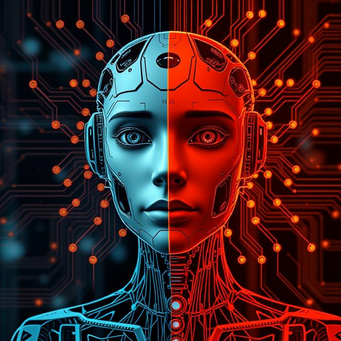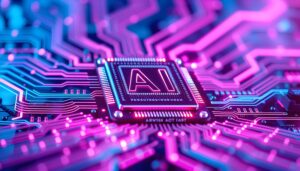
This article explores the ethical challenges surrounding artificial intelligence (AI), addressing issues like bias, privacy, accountability, and societal impact. It discusses the importance of AI ethics frameworks, fairness in AI decision-making, and the implications of AI on personal freedoms and human rights.
Introduction to AI Ethics
Artificial Intelligence (AI) is not just a technological advancement—it’s an evolving force that’s reshaping every aspect of human life. From self-driving cars to AI-powered medical diagnostics, AI promises enormous potential. However, its rapid growth also introduces profound ethical dilemmas. AI ethics refers to the guidelines, principles, and practices designed to ensure that AI is developed and deployed responsibly, without causing harm or perpetuating societal inequalities.
Central to AI ethics are issues of fairness, accountability, transparency, privacy, and safety. For instance, algorithms that drive AI systems must be designed to minimize biases, while ensuring decisions are explainable and auditable. At the same time, society must confront the question of how AI impacts human rights and personal freedoms. As AI technologies evolve, it’s essential to continuously revisit these ethical considerations to ensure that the benefits outweigh the risks.
The growing ethical discourse around AI has spurred efforts by governments, private organizations, and international bodies to draft and implement ethical frameworks. For example, the European Commission has outlined a set of AI ethics guidelines that emphasize human-centric AI, ensuring that it remains a tool for human empowerment, not control.
For further reading on AI ethics principles, visit the European Commission’s AI Ethics Guidelines at https://ec.europa.eu/digital-strategy/our-policies/ethics-ai.
Bias and Fairness in AI Systems
AI systems are only as good as the data used to train them, and biased data can lead to biased outcomes. This issue is particularly concerning when AI systems are applied in sensitive areas like hiring, criminal justice, and healthcare, where biased algorithms can perpetuate existing inequalities. For instance, facial recognition technology has been shown to misidentify people of color at higher rates than white individuals, and AI systems used in hiring have been criticized for favoring male candidates over female candidates.
This is not just a technical issue but a societal one, as it exacerbates disparities in important life outcomes. As AI systems become more integrated into decision-making processes, it is crucial to address this bias through diverse datasets, robust training methodologies, and fairness-aware algorithms.
To tackle these challenges, experts advocate for the development of ethical AI frameworks that prioritize fairness. This includes adjusting algorithms to eliminate discriminatory patterns, promoting transparency in AI decision-making processes, and ensuring that AI technologies are tested against diverse datasets. Additionally, the increasing use of “algorithmic audits”—external evaluations of AI systems—can provide a valuable check on these technologies.
To learn more about efforts to combat bias in AI, visit the Fairness, Accountability, and Transparency (FAT*) Conference website at https://fatconference.org.
Privacy Issues and Data Security
As AI systems become more integrated into our lives, they are processing vast amounts of personal data, leading to growing concerns about privacy and data security. AI systems rely on large datasets to function, but these datasets often contain sensitive personal information, such as health data, financial transactions, and even behavioral patterns. Mishandling this data could result in privacy breaches and a loss of trust in AI technologies.
A notorious example of privacy violations is the Cambridge Analytica scandal, where personal data from millions of Facebook users was harvested without their consent and used to influence political decisions. This event highlighted the dangers of improper data handling and the urgent need for stronger privacy protections in AI systems.
The General Data Protection Regulation (GDPR) in Europe is one of the most comprehensive data protection laws in the world. It mandates transparency in data collection and requires organizations to obtain informed consent from individuals. Additionally, GDPR includes specific provisions for AI systems, ensuring that individuals have control over how their data is used and processed.
To explore data privacy regulations, visit the European Commission’s page on GDPR at https://ec.europa.eu/info/law/law-topic/data-protection_en.
Accountability and Responsibility in AI Decision Making
AI systems are often designed to operate autonomously, which raises important questions about accountability. When an AI system makes an error—whether it’s an autonomous vehicle causing a crash or a medical diagnosis tool offering a wrong recommendation—who is responsible? This dilemma becomes even more complicated when the AI system’s decision-making process is opaque, making it difficult for stakeholders to trace the root cause of the error.
In 2018, an autonomous Uber vehicle struck and killed a pedestrian, highlighting the challenges of assigning liability for AI actions. Was the company responsible for deploying an untested system, or did the AI system itself fail? As AI technology continues to evolve, establishing clear guidelines for accountability is crucial to ensure that companies and individuals who deploy AI systems are held responsible for their actions.
Legal frameworks for AI accountability are still developing, but some experts suggest that AI systems could eventually be treated as legal entities with specific rights and responsibilities. This would allow for clearer guidelines on liability and compensation in case of harm. However, many also argue that human oversight should remain central to AI decision-making, particularly in high-stakes environments like healthcare, finance, and law enforcement.
To dive deeper into AI accountability frameworks, visit the AI Now Institute’s page at https://ainowinstitute.org.
The Role of Governments and Regulations in AI Ethics
As AI continues to permeate various sectors of society, governments around the world are beginning to take action to regulate its development and deployment. The role of governments in AI ethics is crucial to ensuring that these powerful technologies are used responsibly and for the public good. While the potential of AI to drive innovation is vast, there are concerns about its risks—especially when it comes to privacy, security, job displacement, and power imbalances.
Governments must establish clear, comprehensive regulatory frameworks that ensure AI is developed in an ethical, transparent, and accountable manner. These frameworks should address issues such as AI transparency, algorithmic accountability, data privacy, and the prevention of discriminatory outcomes. Moreover, there should be specific regulations in place to prevent harmful practices, such as the misuse of AI for surveillance or creating deepfake content.
The European Union has been a leader in AI regulation with its AI Act, introduced in 2021. This regulation categorizes AI applications into various risk levels, from low-risk applications (like chatbots) to high-risk ones (such as biometric surveillance and autonomous vehicles). The goal of the AI Act is to ensure that AI is used safely and ethically, without compromising fundamental rights. The EU’s proactive stance on AI regulation serves as a model for other regions, encouraging a global conversation on the ethical use of AI.
Similarly, the U.S. has seen increased discussions around AI regulation. The National AI Initiative Act of 2020 aims to foster the development of AI in the United States while ensuring that it is used responsibly. The U.S. has focused on promoting AI innovation but also recognizes the need for policies that safeguard against potential harm. However, the absence of a comprehensive national AI ethics framework has raised concerns about whether existing laws are sufficient to address the rapid pace of AI advancement.
In addition to national regulations, international cooperation is essential in creating global AI standards. AI technologies transcend borders, and the ethical challenges associated with AI are shared across countries. Organizations like the OECD and the United Nations have been actively involved in developing international frameworks that promote the responsible use of AI.
For example, the OECD AI Principles emphasize the importance of promoting innovation while ensuring that AI systems are fair, transparent, and accountable. These principles encourage governments and organizations to adopt regulatory frameworks that balance the benefits of AI with its potential risks. The United Nations’ AI for Good initiative similarly focuses on fostering international collaboration and aligning AI development with sustainable development goals.
As AI evolves, the role of governments and international organizations in regulating AI will become even more critical. Policymakers must work alongside researchers, developers, and ethicists to build regulatory mechanisms that ensure AI’s benefits are shared equitably, and its risks are minimized.
For more on AI regulations, visit the European Commission’s page on the AI Act at https://ec.europa.eu/digital-strategy/our-policies/ethics-ai and the OECD’s AI Principles at https://www.oecd.org/going-digital/ai.
AI and Its Impact on Society
The societal impact of AI is far-reaching, with both positive and negative implications. On the positive side, AI holds the potential to transform industries, improve efficiency, and create new job opportunities. In healthcare, for example, AI-powered tools can help doctors diagnose diseases faster and more accurately, while in agriculture, AI systems can optimize crop yields. AI also plays a significant role in climate change solutions, from optimizing energy consumption to analyzing environmental data.
However, there are concerns about how AI will affect employment. As AI technologies become more advanced, they are expected to automate tasks currently performed by humans, leading to job displacement in sectors like manufacturing, transportation, and customer service. This raises questions about how society will adapt to these changes and whether new types of jobs will be created to replace those lost to automation.
Furthermore, the concentration of power in the hands of a few large tech companies that control AI technologies raises concerns about inequality. These companies could potentially leverage AI to reinforce their market dominance, exacerbating the divide between the rich and the poor.
Balancing AI’s potential for societal benefit with its potential for harm requires careful governance. Governments and organizations need to work together to develop policies that ensure AI is used responsibly, with safeguards in place to prevent misuse and mitigate negative consequences.
For insights into AI’s societal impact, visit the OECD’s AI Policy Observatory at https://www.oecd.org/going-digital/ai/.
The Future of AI Ethics: What’s Next?
Looking ahead, the ethical landscape of AI will continue to evolve as technology advances. New challenges are expected to arise, especially as AI systems become more autonomous and capable of making complex decisions without human intervention. As these systems become more integrated into critical aspects of society, it will be essential to maintain a rigorous ethical framework that can keep pace with AI’s rapid development.
One area of focus in the near future is the development of explainable AI (XAI), which aims to make the decision-making process of AI systems more transparent. This will be particularly important in fields like healthcare, where AI-driven decisions can have life-or-death consequences. By making AI systems more understandable and interpretable, stakeholders can better assess how decisions are made and ensure that they align with ethical standards.
Another critical issue will be the regulation of AI at the global level. As AI technologies cross borders, international cooperation will be necessary to establish global standards for AI ethics, safety, and accountability. Efforts such as the United Nations’ AI for Good initiative are already underway to foster international dialogue and develop frameworks that promote the responsible use of AI for the benefit of humanity.
To explore the future of AI ethics and governance, refer to the United Nations’ AI for Good initiative at https://aiforgood.itu.int.
FAQs
1. What is AI ethics?
- AI ethics involves the study of moral issues related to AI, including fairness, transparency, privacy, accountability, and how these technologies impact human rights and society.
2. How does bias in AI occur?
- Bias in AI occurs when algorithms are trained on biased data, leading to unfair or discriminatory outcomes. This can be mitigated by using diverse, representative datasets and fairness algorithms.
3. What is the role of explainable AI?
- Explainable AI (XAI) aims to make AI decision-making processes more transparent and understandable, ensuring that users can trust and verify AI decisions, especially in high-stakes fields.
4. Who is responsible if an AI system makes a mistake?
- Responsibility for AI mistakes is often shared between the developers, organizations deploying the system, and possibly the manufacturers. Legal frameworks for accountability are still being developed.
5. How can AI affect privacy?
- AI systems often rely on vast amounts of personal data, leading to concerns about data breaches, unauthorized access, and violations of privacy. Regulations like GDPR aim to protect users’ data rights.
For further exploration into AI ethics and regulations, visit the following resources:
- AI Now Institute: https://ainowinstitute.org
- OECD AI Principles: https://www.oecd.org/going-digital/ai
- United Nations AI for Good: https://aiforgood.itu.int
Did you find this helpful? If you did, please share and stay tuned to our blog!!



